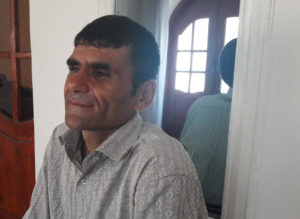
Author: Nargis Harambaeva, Tajikistan
Umed Boev, age 41, an ex-prisoner from Tajik town of Bokhtar advocates healthy lifestyle among risk groups – people who use drugs, sex workers and ex-prisoners.
In 2001, when Umed was 24, he went to Russia to earn money. He liked partying and spent quite some money on that. In 2004, during one get-together he had a quarrel and a fight, causing another person grievous bodily harm. He was sentenced for 10 years and served his time at Novosibirsk maximum security prison.
While in confinement, Umed tried heroin for the first time. One syringe was often shared by many people. One day his fellow countrymen, who served sentence in the same prison, found out and talked to him.
“They convinced me to stop taking drugs, telling me that prayers would help. I mustered all my will power, it was extremely hard during withdrawal, but I stuck it out. I prayed hard and it really helped me. I stopped using drugs,” tells Umed.
10 years later, when Umed returned home, he was diagnosed with HIV.
“Upon return, I first worked at a construction site, then the crisis hit and the construction was put on hold. I needed money. An acquaintance of mine told me I could donate blood and get some money that way. Therefore, I went to the clinic and they did an HIV test and the result was positive. I was registered with the clinic but I did not take my diagnosis seriously, did not take antiretroviral therapy,” recalls Umed.
Timely request for help
Because of his weak immune system, soon Umed developed tuberculosis.
“In December 2015, I suddenly felt very ill, had a torturing cough for three months. In April 2016, I was taken to a hospital and diagnosed with tuberculosis. I was in a very poor state of health. I could not even walk, had no appetite. During that time, I rapidly lost 20 kilos. Only later doctors told me I turned for help just in time. Another couple of weeks and I would have died. I was treated, and recently when I had fluorography examination tuberculosis was gone. I am so happy about that,” he says.
Today Umed is a participant of the START Plus programme implemented with AFEW-Tajikistan. The purpose of the programme is to reduce the prevalence level of public health concerns like HIV, TB and viral hepatitis at penitentiary facilities and improve the quality of life of persons released from prison.
“I discovered help for people like me when I was diagnosed with tuberculosis. I came to AFEW-Tajikistan local office in Bokhtar. I received food packages as well as assistance in the form of information. Currently, they are helping with the purchase of necessary medicines,” tells Umed.
Becoming part of the Board
Umed is a member of the Board of representatives of key population groups that was organised within AFEW-Tajikistan office in Bokhtar to help persons in risk groups who are neglecting their health.
“There are four of us in the Board. I am responsible for creating awareness among key groups about infectious diseases. These groups include ex-prisoners, people who use drugs and sex workers. We help AFEW-Tajikistan, inform them about the needs of the groups, adjust assistance that is being provided so that it gains better quality and effectiveness,” says Umed.
By the way, one of the topics of the 22nd International AIDS Conference in Amsterdam is prison health. Other public health issues like HIV, hepatitis and TB in Eastern Europe and Central Asia will be also in focus during AIDS 2018.



